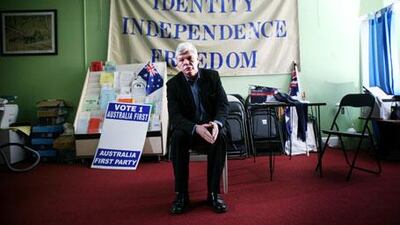SYDNEY // Dismissed as dangerous and delusional by critics, the far right of Australian politics is promising a re-energised campaign to reassert the dominance of the country's Anglo-Saxons with policies to end immigration and demolish multiculturalism. Small ultra-conservative groups are hoping to prosper amid economic uncertainty and simmering racial tensions to revive the glory days of Australia's right wing. In the mid-1990s, the One Nation party of Pauline Hanson, a former fish and chip shop owner, burst into Australian politics warning of a damaging surge in Asian immigration. By 1998, Ms Hanson's provocative rhetoric had attracted the support of one million people, her party winning 11 seats in the Queensland state election with nearly one-quarter of the entire vote. The xenophobic movement that shook Australia faded almost as quickly as it had emerged but there are signs that the far right has started to regroup. The nationalist Australia First party intends to register as a federal political organisation and run candidates in selected areas. "We'll be arguing a package of policies, including the cessation of all immigration to Australia and the dismantling of multiculturalism," said Jim Saleam, the party's chairman in New South Wales. "Australia has created what are effectively branches of other nations on Australian soil. I believe that there are many migrants who have no place in Australia whatsoever," he explained at his dingy office in suburban Sydney, which has recently been attacked by unknown assailants. Australia First's agenda is uncompromising and divisive. The party believes that multiculturalism has been a disaster and that migrants should either assimilate or go home. "It has been seen recently in the incredible attacks upon foreign students in Australia, which were actually carried out by other immigrants and we are seeing a lot of crime, disorder and trouble in schools. There is likely to be increasing violence and community tension," said Mr Saleam, who was jailed for four years in the early 1990s for possession of a firearm. Groups agitating on the right-wing edges of politics are small and, at present, electorally weak, but activists have maintained that tough talk on immigration and more protection for Australian industries will be enough to see their fortunes change. "We believe there is a groundswell of opinion," said Mr Saleam. "The former One Nation party, many of its voters and organisers are now finding their way into Australia First. We're expecting more people to join." What happens on the periphery of political discussion has in the past profoundly influenced the mainstream. One Nation's success more than a decade ago took the major parties by surprise and prompted the former conservative prime minister John Howard to toughen his stance on immigration. Boatloads of asylum seekers were turned away and offshore detention camps were set up in remote parts of the South Pacific in an attempt to deter illegal migration. Politically, the measures worked well and allowed Mr Howard to tap into the well of disaffection among voters that One Nation had exploited, helping the veteran leader win successive elections in 2001 and 2004.
Rawan Abdullah, a Palestinian activist in Sydney, believes that such electoral opportunism allowed racist tendencies to fester and go unchecked, which has given ultranationalist groups the oxygen they need. "It is quite dangerous. The sort of anti-refugee, anti-immigrant rhetoric that was allowed to gain momentum during that time and something like this was bound to happen," she said of Australia First's plans to contest elections. "It is indicative of the type of hysteria against Muslims, Arabs and also immigrants. Last year we saw anti-Sudanese rhetoric and now Indian students are being targeted across Australia. That sort of thing shows the underlying racist tensions in Australian society," added Ms Abdullah, who chose to use a pseudonym due to concerns about speaking out on such a sensitive issue. "There are many people who recognise that this sort of racism does not have a place here and a lot of ordinary Australians I meet are very worried," she said. History has shown that xenophobia has flourished in Australia when times are bad. "If we go back to the Great Depression of the 1930s that is when Australia witnessed a great uprising of something close to fascist sentiment and that was on the basis of economic unhappiness, mass unemployment and a feeling that the system had failed the ordinary person," said Geoffrey Hawker, the head of the discipline of politics and international relations at Macquarie University in Sydney. Analysts have indicated that parties on the extremes of conservative ideology are driven not by realistic hopes of electoral success but by fantasy. "I think there is partly true delusion amongst some of the members," said Mr Hawker. "There is a totally mistaken world view but equally the leadership of these groups can often get a lot of satisfaction from being seen to lead a movement. It might only be one or two hundred cheering supporters but they feel like they are on the cusp of history and have some sort of personal sense of power." pmercer@thenational.ae

